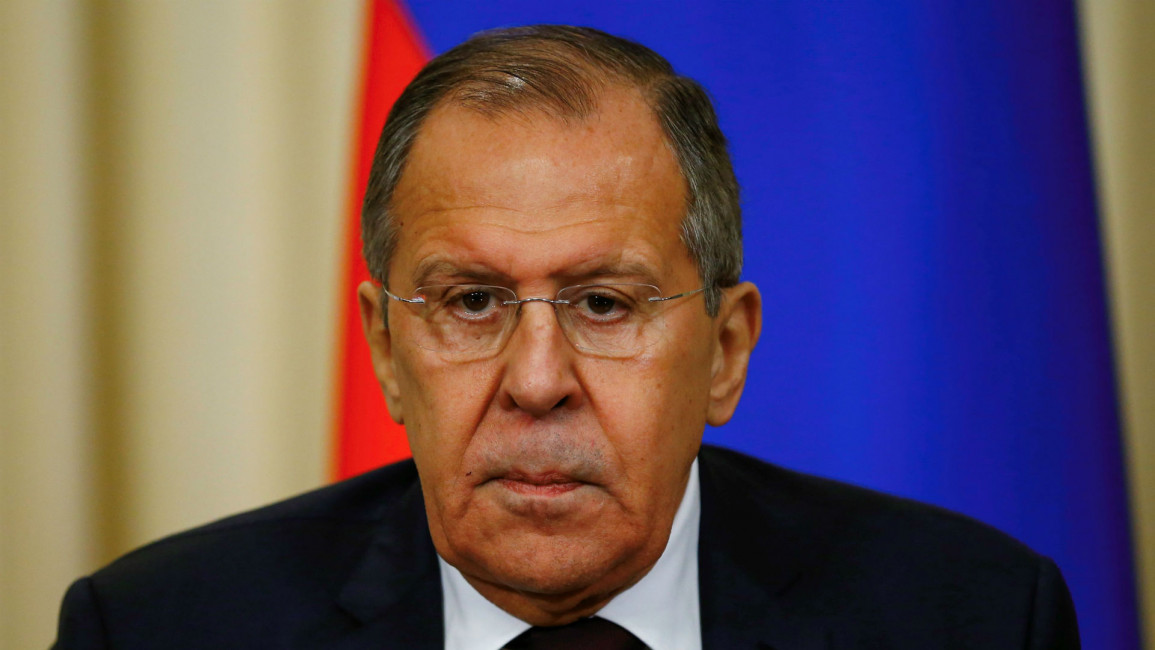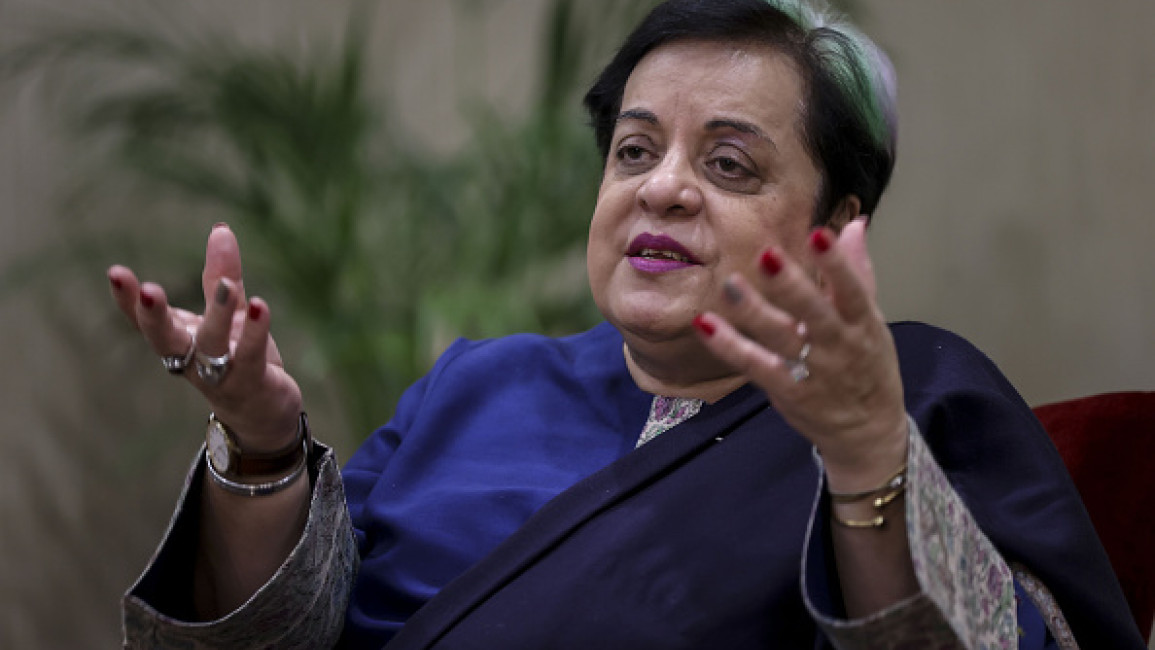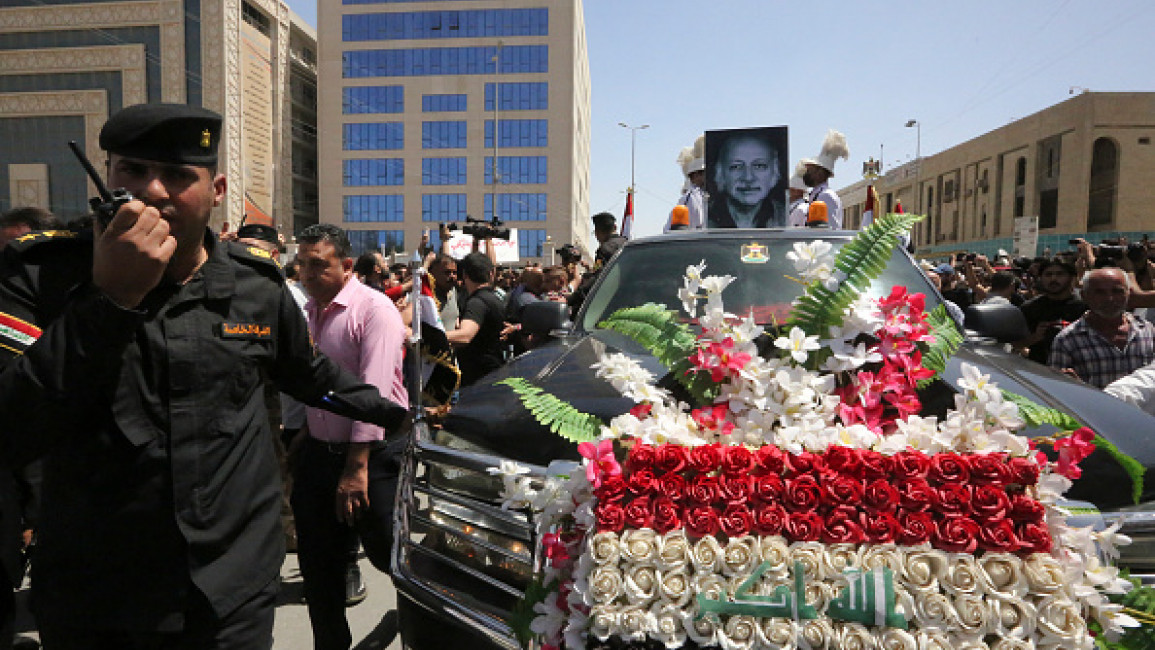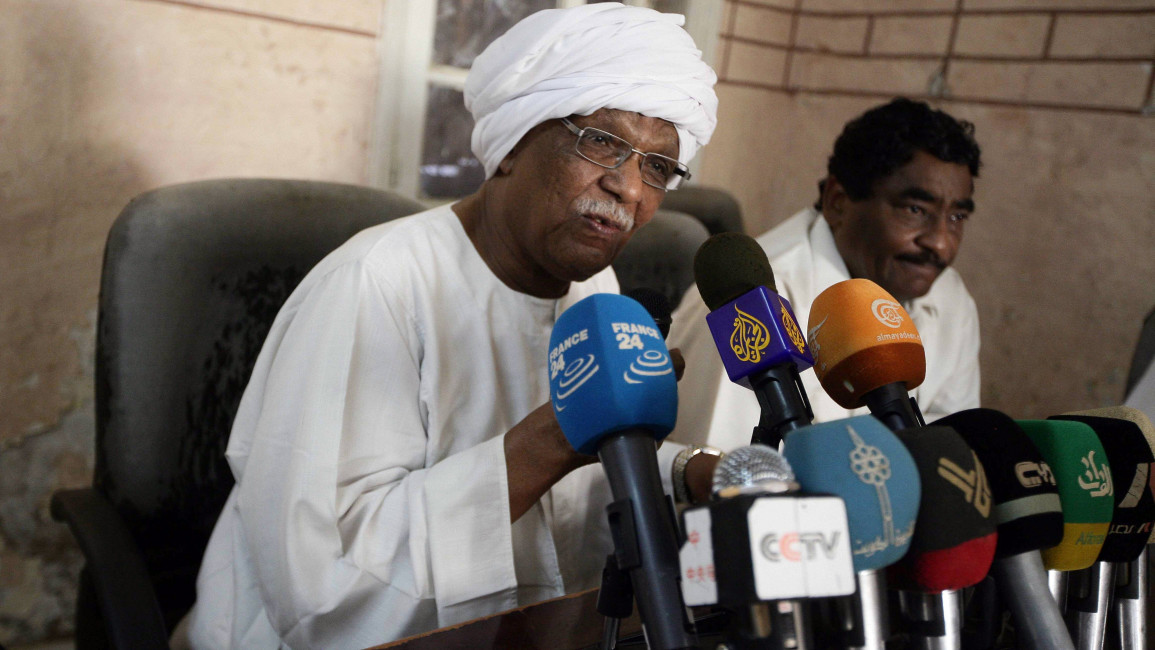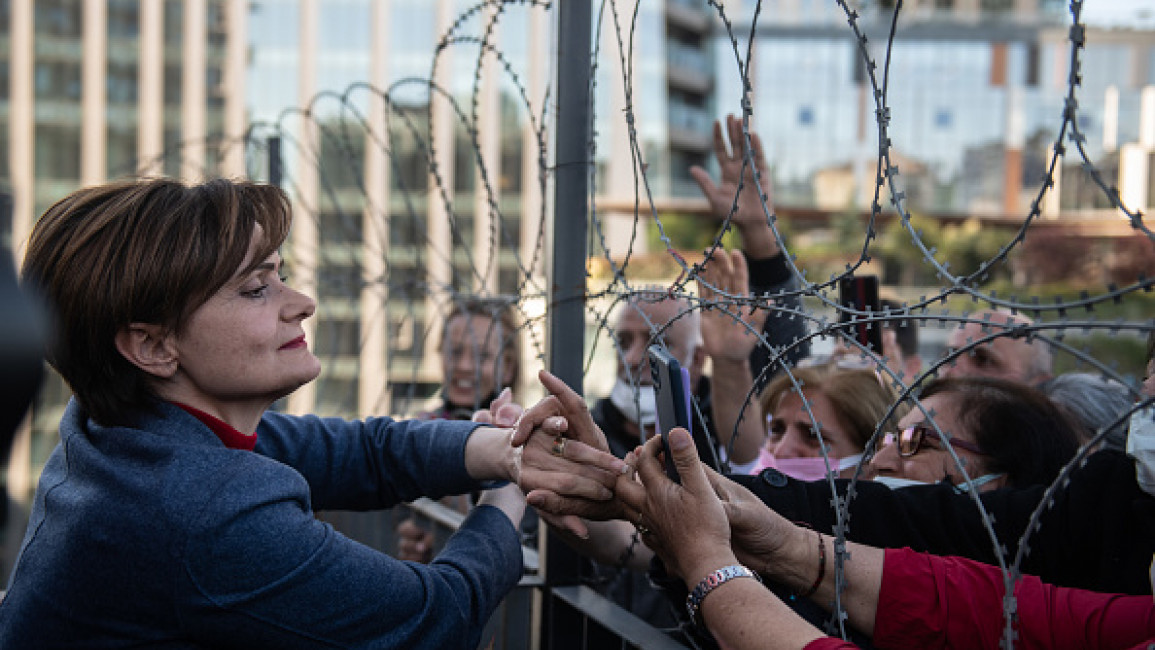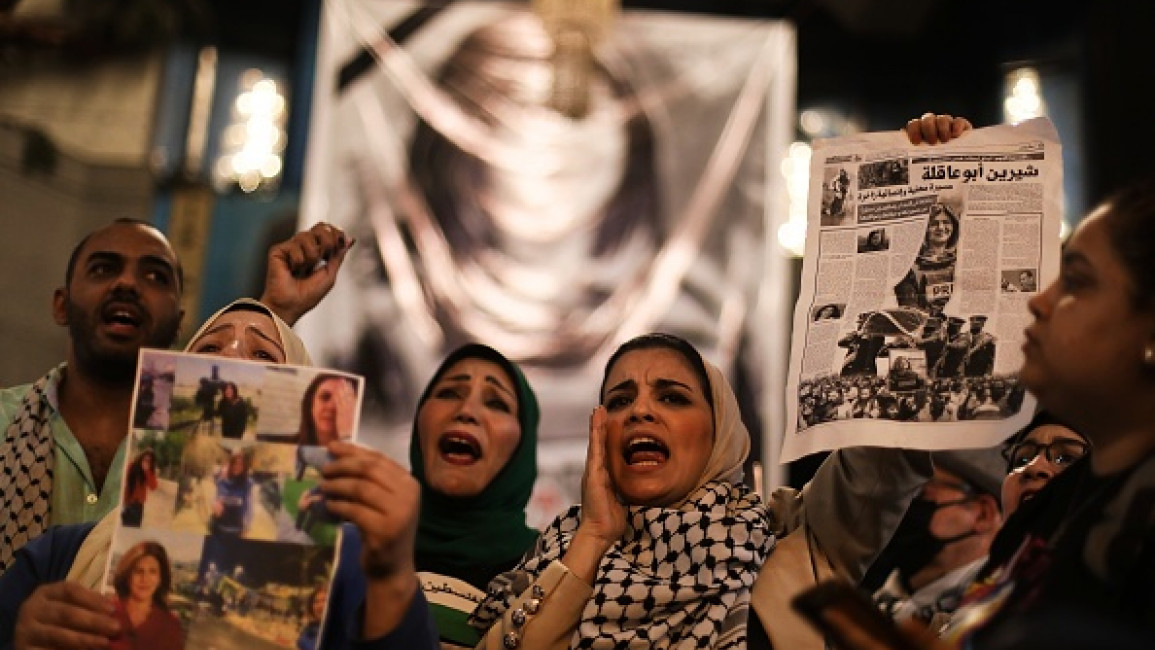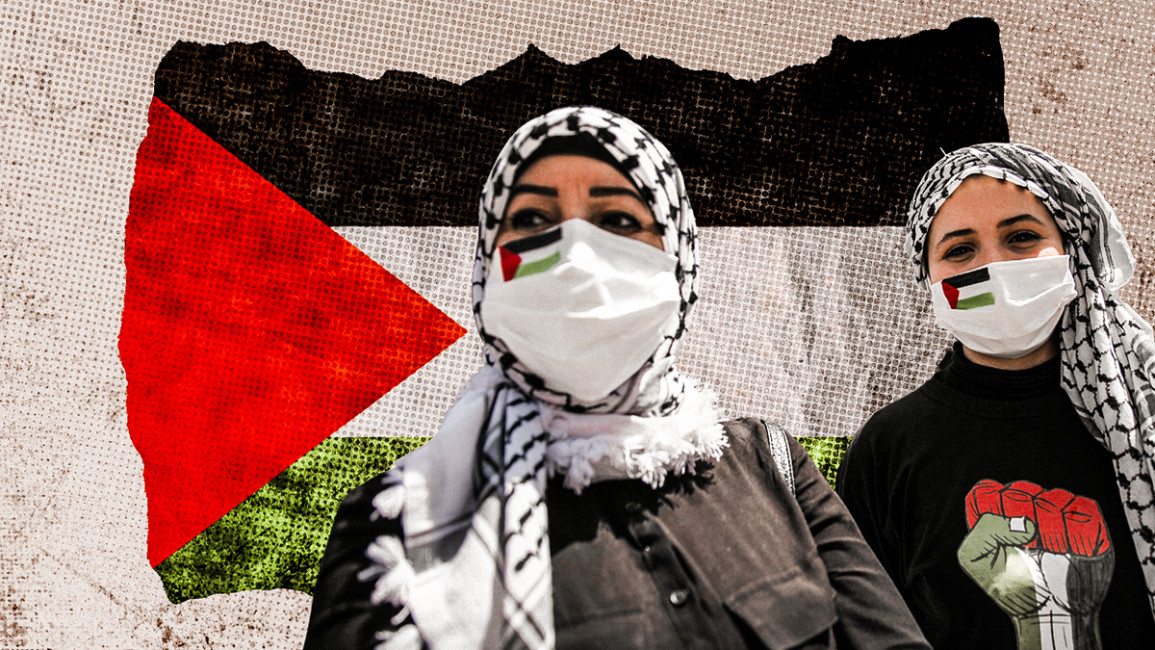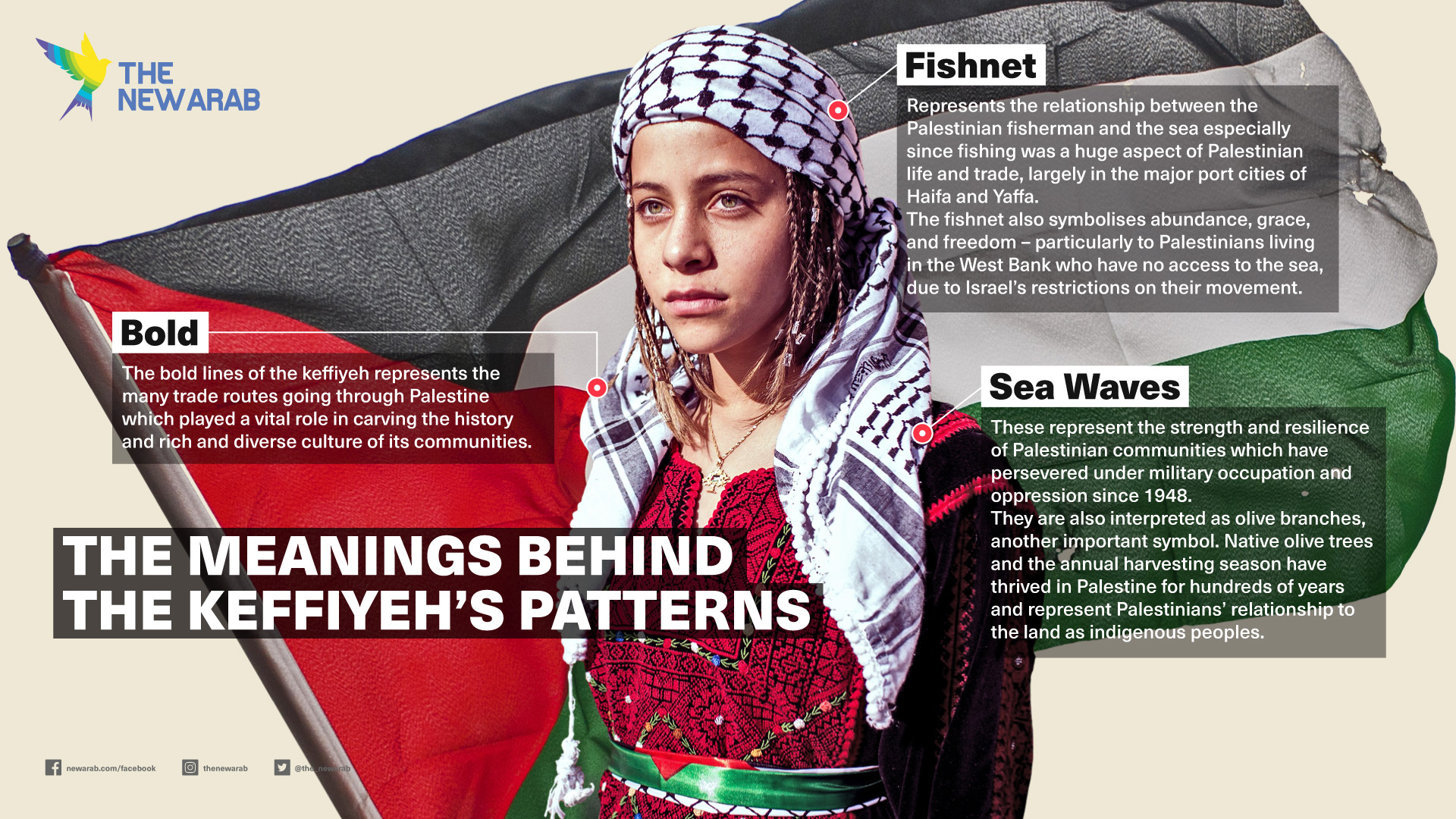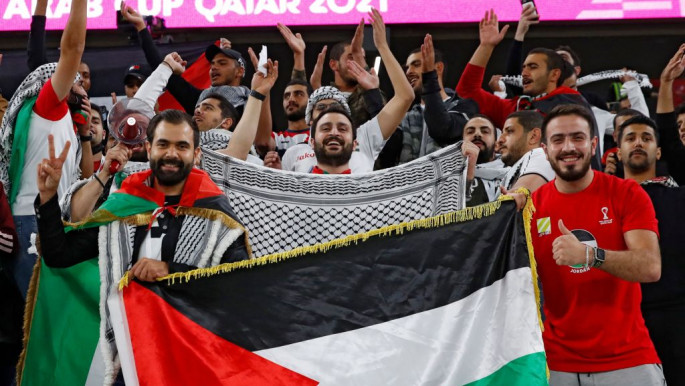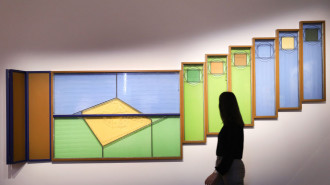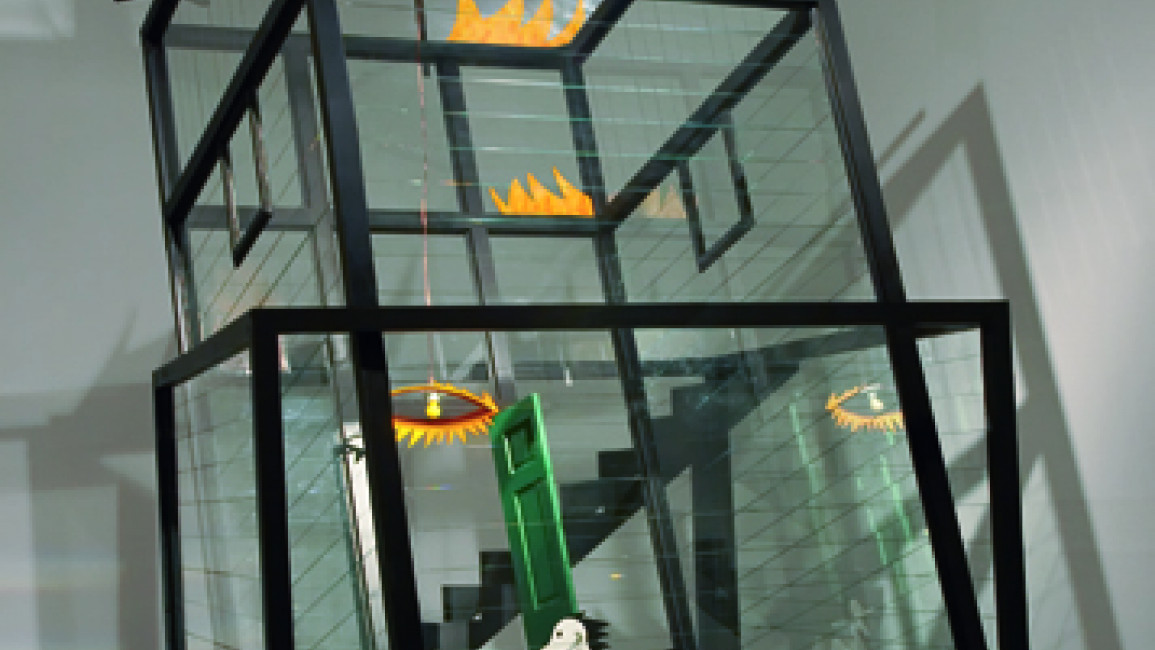US senator hits out at treatment of Alaa Abdel-Fattah, Egypt's rights record
The comments came after the Egyptian activist has spent seven weeks on hunger strike to protest his prison conditions.
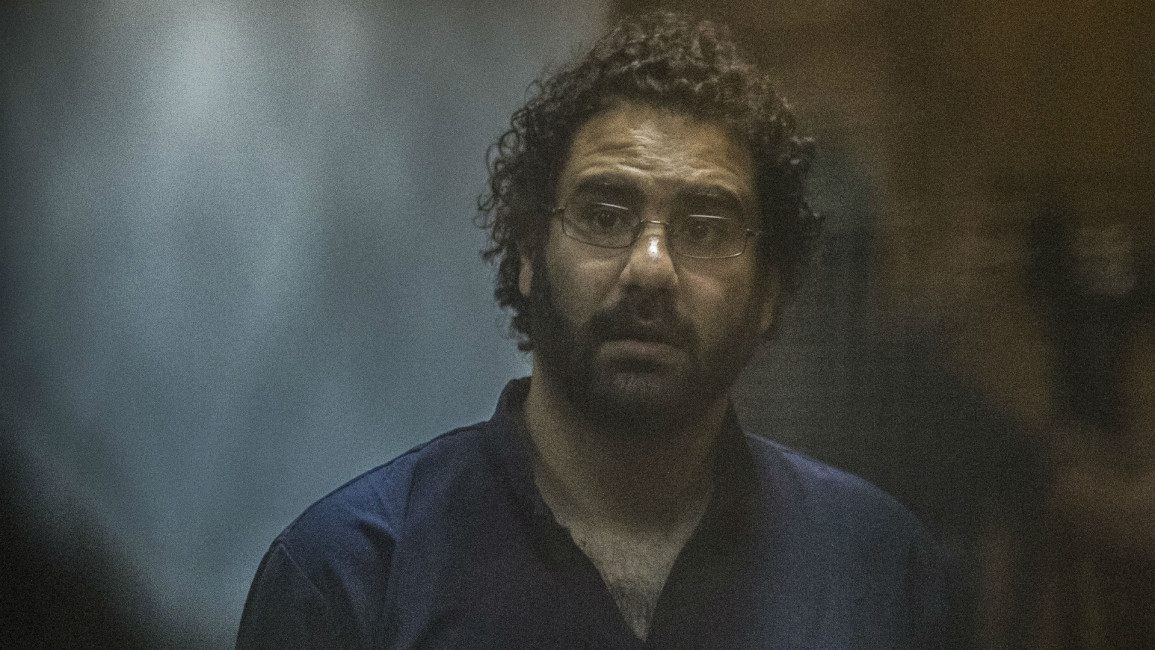
The activist has spent most of the past decade behind bars, and his detention has become a symbol of Egypt’s return to autocratic rule [Getty]
The New Arab Staff
21 May, 2022
The US Senate's longest serving member has rebuked Egyptian authorities for continuing to detain activist and blogger Alaa Abdel-Fattah, calling his treatment “reminiscent of the Middle Ages”.
Democrat senator for Vermont Patrick Leahy told Congress that while he welcomed the release of dozens of political prisoners last month, “thousands of other opposition figures remain behind bars for acts of free speech and association that are not crimes under international law.”
“It is hard to take seriously Egypt’s new ‘human rights strategy’.... A serious human rights strategy would include repealing laws that are used to criminalise speech and association, real consequences for ignoring maximum limits on pre-trial detention, and protections of the rights of prisoners,” he said.
“Egypt is an important ally of the United States. We share a common interest in a peaceful Middle East - but on human rights we have profound differences,” his speech concluded - on the same day that the US approved a sale of hundreds of millions of dollars in weapons to Egypt.
Leahy’s statement at the US senate came after news that Abdel-Fattah had been transferred to a prison in Wadi al-Natrun early on Thursday.
He had been on hunger strike since 2 April, to protest the conditions in which he was being held.
The dual British-Egyptian national reportedly had said goodbye to his loved ones earlier this month as his health continued to deteriorate.
His family and British parliamentarians have appealed for help from the UK government in securing his full release, but to little avail.
On Wednesday, 27 politicians wrote to foreign secretary Liz Truss, asking her to use “all means possible to secure consular access to Mr. Abd el-Fattah” and “insist on immediate improvements to his prison conditions”.
The group, formed of nine MPs and 18 members of the House of Lords, is yet to receive a response from the Foreign Office.
Egypt's government under the president of Abdel-Fattah El-Sisi has been accused by local and international rights groups of overseeing the country's worst crackdown on human rights in decades, with some 60,000 of its critics currently behind bars.
Jailed Egypt activist Alaa Abdel-Fattah moved to new prison, family says
Imprisoned activist Alaa Abdel-Fattah, a key figure in Egypt's 2011 revolution who is currently on a hunger strike, has been moved from Cairo's notorious Tora prison to Wadi El-Natroun, according to his sister Mona Seif.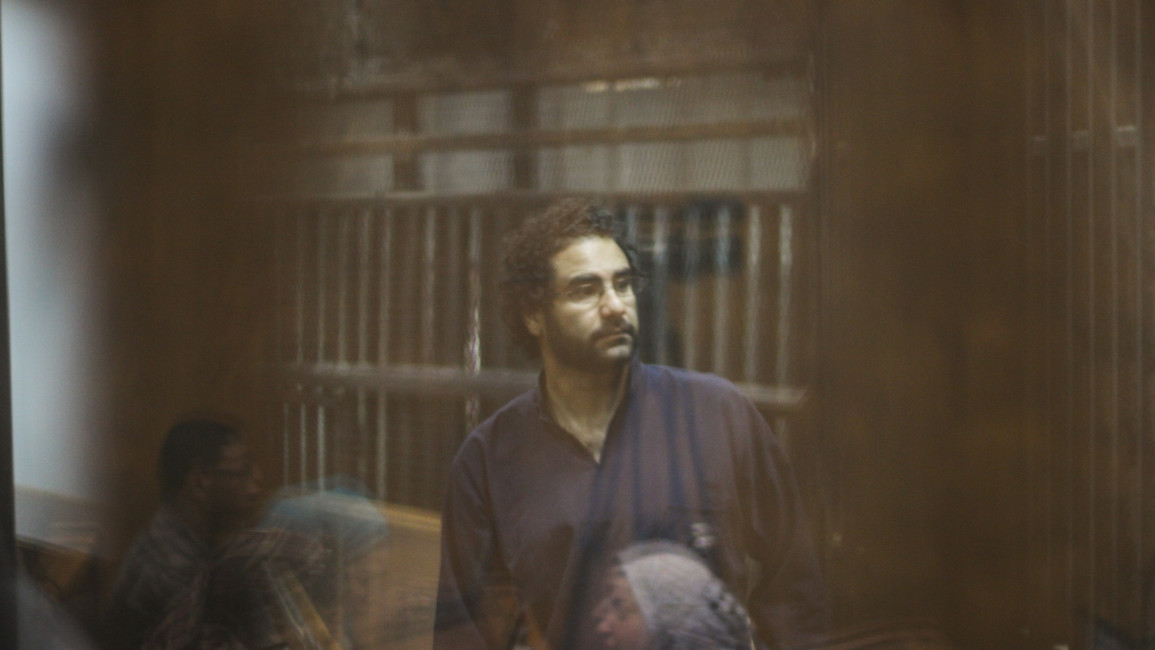
Renowned Egyptian activist Alaa Abdel-Fattah has been on hunger strike for almost 48 days [Getty]
The New Arab Staff & Agencies
19 May, 2022
Egyptian authorities have transferred a prominent political activist from a maximum-security prison where he was allegedly tortured and denied basic rights to a new correctional facility, his family said on Thursday.
Alaa Abel-Fattah was transferred from Cairo's Tora prison complex to Wadi El-Natroun prison in the north of the country, where he was visited on Thursday by his family, his sister Mona Seif wrote on Twitter.
The transfer came as Abdel-Fattah had been on a hunger strike for nearly 48 days to protest his imprisonment conditions, according to his family. Abdel-Fattah had been serving time in one of Tora complex's most notorious prisons since his last arrest in September 2019.
"We’re really glad that Alaa Abd El Fattah has been removed from the 'guardianship' of officers who bore him a personal hatred. We’re relieved that he is is in a place which has some medical facilities," his aunt, award-winning novelist Ahdaf Soueif wrote on her Facebook page.
Abdel-Fattah has been constantly denied access to books, exercise time outside his cell, regular visits, and proper medical care, according to his family. He had previously filed several complaints documenting his mistreatment and alleging that he was beaten and humiliated by some prison officers.
Earlier this month, hundreds of Egyptian women filed a petition entitled "A Mothers' Plea" with the state-appointed National Council for Human Rights, demanding the release of the 40-year-old programmer. In response, Moushira Khattab, NCHR president announced that authorities agreed to transfer him to the newly-erected Wadi El-Naturn prison complex, where she said, human rights standards are met.
Abel-Fattah is an outspoken dissident who rose to prominence during the 2011 pro-democracy uprisings that swept the Middle East and in Egypt, toppling long-time President Hosni Mubarak. The activist spent most of the past decade behind bars, and his detention has become a symbol of Egypt’s return to autocratic rule.
Last month, Abdel-Fattah’s family said that he had gained British citizenship through his mother, Laila Soueif, a math professor at Cairo University who was born in London. The family said they sought a British passport for Abdel-Fattah as a way out of his “impossible ordeal.”
Abdel-Fattah arrived on Wednesday morning in his new prison, which is located in a desert valley 150 kilometers north of Cairo, said his sister. She added that he is being held in a big cell with three other prisoners, and is allowed to sleep on a mattress for for the first time in years.
The government of President Abdel Fattah El-Sisi, a US ally with deep economic ties to European countries, has been relentlessly silencing dissenters and clamping down on independent organisations for years with arrests and restrictions. Many of the top activists involved in the 2011 uprising are now in prison, most under a draconian law passed in 2013 effectively banning all street protests.
"We do not know if this means an improvement in conditions," his sister said in a video posted earlier on Facebook. "The problem with the prison where Alaa was is not just that it is maximum-security prison, it is that the ministry of interior and state security and Egyptian authorities were actively depriving him of every facility and every right that should be easily provided in the prison".
Seif said that her brother will continue with his hunger strike until "an independent judge" reviews his complaints about imprisonment conditions.
Abdel-Fattah was first sentenced in 2014 after being convicted of taking part in an unauthorised protest and allegedly assaulting a police officer. He was released in 2019 after serving a five-year term but was rearrested later that year in a crackdown that followed rare anti-government protests.
In December, he was sentenced to five years in prison after being convicted of spreading false news. Abdel-Fattah separately faces charges of misusing social medial and joining a terrorist group- a reference to the banned Muslim Brotherhood, which authorities declared a terrorist organisation in 2013.
Imprisoned activist Alaa Abdel-Fattah, a key figure in Egypt's 2011 revolution who is currently on a hunger strike, has been moved from Cairo's notorious Tora prison to Wadi El-Natroun, according to his sister Mona Seif.

Renowned Egyptian activist Alaa Abdel-Fattah has been on hunger strike for almost 48 days [Getty]
The New Arab Staff & Agencies
19 May, 2022
Egyptian authorities have transferred a prominent political activist from a maximum-security prison where he was allegedly tortured and denied basic rights to a new correctional facility, his family said on Thursday.
Alaa Abel-Fattah was transferred from Cairo's Tora prison complex to Wadi El-Natroun prison in the north of the country, where he was visited on Thursday by his family, his sister Mona Seif wrote on Twitter.
The transfer came as Abdel-Fattah had been on a hunger strike for nearly 48 days to protest his imprisonment conditions, according to his family. Abdel-Fattah had been serving time in one of Tora complex's most notorious prisons since his last arrest in September 2019.
"We’re really glad that Alaa Abd El Fattah has been removed from the 'guardianship' of officers who bore him a personal hatred. We’re relieved that he is is in a place which has some medical facilities," his aunt, award-winning novelist Ahdaf Soueif wrote on her Facebook page.
Abdel-Fattah has been constantly denied access to books, exercise time outside his cell, regular visits, and proper medical care, according to his family. He had previously filed several complaints documenting his mistreatment and alleging that he was beaten and humiliated by some prison officers.
Earlier this month, hundreds of Egyptian women filed a petition entitled "A Mothers' Plea" with the state-appointed National Council for Human Rights, demanding the release of the 40-year-old programmer. In response, Moushira Khattab, NCHR president announced that authorities agreed to transfer him to the newly-erected Wadi El-Naturn prison complex, where she said, human rights standards are met.
Abel-Fattah is an outspoken dissident who rose to prominence during the 2011 pro-democracy uprisings that swept the Middle East and in Egypt, toppling long-time President Hosni Mubarak. The activist spent most of the past decade behind bars, and his detention has become a symbol of Egypt’s return to autocratic rule.
Last month, Abdel-Fattah’s family said that he had gained British citizenship through his mother, Laila Soueif, a math professor at Cairo University who was born in London. The family said they sought a British passport for Abdel-Fattah as a way out of his “impossible ordeal.”
Abdel-Fattah arrived on Wednesday morning in his new prison, which is located in a desert valley 150 kilometers north of Cairo, said his sister. She added that he is being held in a big cell with three other prisoners, and is allowed to sleep on a mattress for for the first time in years.
The government of President Abdel Fattah El-Sisi, a US ally with deep economic ties to European countries, has been relentlessly silencing dissenters and clamping down on independent organisations for years with arrests and restrictions. Many of the top activists involved in the 2011 uprising are now in prison, most under a draconian law passed in 2013 effectively banning all street protests.
"We do not know if this means an improvement in conditions," his sister said in a video posted earlier on Facebook. "The problem with the prison where Alaa was is not just that it is maximum-security prison, it is that the ministry of interior and state security and Egyptian authorities were actively depriving him of every facility and every right that should be easily provided in the prison".
Seif said that her brother will continue with his hunger strike until "an independent judge" reviews his complaints about imprisonment conditions.
Abdel-Fattah was first sentenced in 2014 after being convicted of taking part in an unauthorised protest and allegedly assaulting a police officer. He was released in 2019 after serving a five-year term but was rearrested later that year in a crackdown that followed rare anti-government protests.
In December, he was sentenced to five years in prison after being convicted of spreading false news. Abdel-Fattah separately faces charges of misusing social medial and joining a terrorist group- a reference to the banned Muslim Brotherhood, which authorities declared a terrorist organisation in 2013.
US approves nearly $700 million in arms to Egypt despite Cairo's 'money woes'
The US has approved the sale of hundreds of million dollars in weapons to Egypt.
Many Egyptians have also bemoaned Egypt's vast spending on arms and the military as the government cuts subsidies and spending on public services hitting the country's poor hardest.

Egypt's purchase of arms comes as the country suffers economic issues [Getty]
The New Arab Staff
20 May, 2022
The US has approved an arms sale, worth hundreds of millions of dollars, to Egypt despite outcry over Cairo's continued human rights abuses and financial woes.
The State Department gave the green light for the sale of $691 million in anti-tank missiles, support, and equipment to Egypt on Thursday, the Defense Security Cooperation Agency (DSCA) said in a press release, despite Cairo's cuts to basic services due to financial issues.
This includes 5,000 TOW 2A missiles and other anti-tank equipment, made by Raytheon Missiles & Defense, Arizona.
"This proposed sale will support the foreign policy and national security of the United States by helping to improve the security of a Major Non-NATO Ally that continues to be an important strategic partner in the Middle East," reported DSCA.
"The proposed sale will enhance Egypt’s capability to strengthen its homeland defense by replenishing its stocks. The missiles will be used for counter-terrorism and border security against armored threats and fortified positions. Egypt will have no difficulty absorbing these additional missiles into its armed forces."
Egypt has been battling Islamic State group militants in the northern Sinai, where an insurgency has raged for almost a decade.
Egypt's counter-insurgency has been criticised by human rights groups, who have highlighted the use of torture, extra-judicial killings, and child soldiers by government-linked forces.
Human rights groups have also called on the US to link arms deals with Egypt to human rights issues.
Egypt has detained thousands of political activists and issued death sentences on members of the Muslim Brotherhood.
There have also been renewed calls for Egypt to free British citizen and activist Alaa Abdel-Fattah, who has been subject to torture and denied basic rights during his detention according to his supporters.
Many Egyptians have also bemoaned Egypt's vast spending on arms and the military as the government cuts subsidies and spending on public services hitting the country's poor hardest.
The US has approved the sale of hundreds of million dollars in weapons to Egypt.
Many Egyptians have also bemoaned Egypt's vast spending on arms and the military as the government cuts subsidies and spending on public services hitting the country's poor hardest.

Egypt's purchase of arms comes as the country suffers economic issues [Getty]
The New Arab Staff
20 May, 2022
The US has approved an arms sale, worth hundreds of millions of dollars, to Egypt despite outcry over Cairo's continued human rights abuses and financial woes.
The State Department gave the green light for the sale of $691 million in anti-tank missiles, support, and equipment to Egypt on Thursday, the Defense Security Cooperation Agency (DSCA) said in a press release, despite Cairo's cuts to basic services due to financial issues.
This includes 5,000 TOW 2A missiles and other anti-tank equipment, made by Raytheon Missiles & Defense, Arizona.
"This proposed sale will support the foreign policy and national security of the United States by helping to improve the security of a Major Non-NATO Ally that continues to be an important strategic partner in the Middle East," reported DSCA.
"The proposed sale will enhance Egypt’s capability to strengthen its homeland defense by replenishing its stocks. The missiles will be used for counter-terrorism and border security against armored threats and fortified positions. Egypt will have no difficulty absorbing these additional missiles into its armed forces."
RELATEDPerspectivesSam Hamad
Egypt has been battling Islamic State group militants in the northern Sinai, where an insurgency has raged for almost a decade.
Egypt's counter-insurgency has been criticised by human rights groups, who have highlighted the use of torture, extra-judicial killings, and child soldiers by government-linked forces.
Human rights groups have also called on the US to link arms deals with Egypt to human rights issues.
Egypt has detained thousands of political activists and issued death sentences on members of the Muslim Brotherhood.
There have also been renewed calls for Egypt to free British citizen and activist Alaa Abdel-Fattah, who has been subject to torture and denied basic rights during his detention according to his supporters.
Many Egyptians have also bemoaned Egypt's vast spending on arms and the military as the government cuts subsidies and spending on public services hitting the country's poor hardest.
